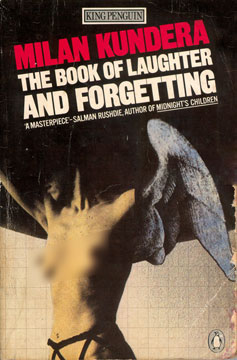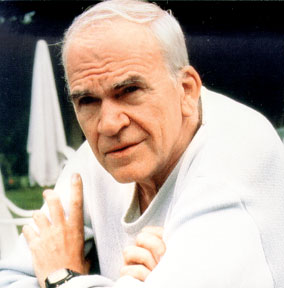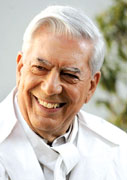|
Politics of memory:
Conceptions and perceptions on 'the past and 'history'
By Dilshan BOANGE
The purpose of this article is to provide an analysis of one of the
highly political novels of Czech born author Milan Kundera which
presents amongst a host of themes and issues deals with the ideal of
memory and politics and what can be treated as 'the past' and 'history.'
In the discussion, this article will build on theoretical ground
developed through academia and intend to provide a deeper unraveling of
the consciousness in the writings of this celebrated author whose work
is claimed as reflective of modernism and postmodernism.

 |
|
Milan Kundera |
Kundera is originally a Czech writer who was made the victim of much
communist persecution for becoming critical of the communist regime
after he became disillusioned with the soviet domination of Eastern
Europe, and went to live in exile in France since 1975.
Kundera though at first had been pro-communist had become an opponent
of communism and its hypocrisy and voiced concern in his writings
against the atrocities perpetrated by communists. Many a notable newness
in narrative form can be found in Kundera's novels, some of the more
known ones being-The Unbearable Lightness of Being, The Book of Laughter
and Forgetting, Immortality, Joke.
Amongst his non-fiction is a trilogy -The Art of the novel,
Testaments Betrayed and The Curtain that is very educative of the
history of the genre of the novel and its development as a literary art
form in Europe and is also implicitly instructive of how the craft of
novel writing can be developed in terms of both content and narrative
form.
Contemporary writers in Sri Lanka would certainly find inspirational
the free flowing style of storytelling that Kundera's writings present,
and may be of interest to those who focus on developing knowledge on
modernist and postmodernist writing.
The idea of 'alternative' streams of knowledge narration through art
and literature which is at times a hotly debated topic can be found to
certain extents in Kunderian writings, which is not 'mainstream' in the
traditional sense when it comes to 'storytelling' through fiction.
The Book of Laughter and Forgetting by Milan Kundera is not a work of
fiction in the traditional sense. A significant portion of the text
carries a biographical component that blends with fictional characters
and events whilst switching to events from the like of the author. The
edition discussed in this article is an English translation by Aaron
Asher form the French (version) of Kundera's. In his novel, Kundera
appears to distinguish 'history' from the 'past' as conceptions that
differ in their politics. To this frame of discussion topics such as
'personal memory' and 'official memory' could be brought in.
History, history writing and commemoration
Prof. Nira Wickramasinghe formerly of the Colombo Varsity's
department of History speaks of the politics of history writing, in
relation to what could be considered in the main stream history writing
in Sri Lanka, in her essay "New History and The Annales school"
published on Introduction to social theory (1994).
"In the choice of events the historian writes about and ignores, in
the style in which s/he chooses to write, in the public he/she chooses
to address his/her writing to, there is an implicit or explicit
understanding of the working of society".
Kundera presents a character named Mirek, who is subject to political
persecution in communist Czech Republic. Mirek's story shows a man who
struggles against the oppressive regime he is trapped in. But Kundera
doesn't appear to sanctify him or his enterprise as uncorrupted by
strains of politics. And the idea of historicity plays a potent role in
political enterprise be it party based or of a more individual personal
approach.
"Mirek rewrote history just like the Communist Party, like all
political parties, like peoples, like mankind. They shout that they want
to shape a better future, but it's not true". (p.30)
The statement which the writer seems to present in the above extrac
suggests the Aristotelian saying-'Man by nature is political animal'.
And the (re)writing of history is seen as a highly deliberate political
act on the part of not only institutions but man in general. Elizabeth
Jelin, a professor in the graduate school of the faculty of law at the
Universidad de Buenos Aires, and Senior Researcher at Argentina's
National Council of Scientific Research, discusses in her scholarly
articles -"What memories are we talking about?" and "Political struggles
for memory." how historians are selective in what they chose to tell,
represent and write about. Citing the words of Heinrich Himmler on the
Nazi's "Final solution," Jelin discusses how state policy may choose to
leave out events in written history. And according to Jelin Himmler had
declared that the "Final solution" was to be-
…[A] "glorious page in our history that has never been written and
that never will be."
|
World news on literature
Mario Vargas Llosa Wins Nobel Literature Prize
 Mario Vargas Llosa, the Peruvian writer and author of novels
including "The Time of the Hero," "The Green House" and "Conversation in
the Cathedral," won the 2010 Nobel Prize in Literature on Thursday. In
its citation, the Swedish Academy hailed Vargas Llosa, 74, "for his
cartography of structures of power and his trenchant images of the
individual's resistance, revolt and defeat." Mario Vargas Llosa, the Peruvian writer and author of novels
including "The Time of the Hero," "The Green House" and "Conversation in
the Cathedral," won the 2010 Nobel Prize in Literature on Thursday. In
its citation, the Swedish Academy hailed Vargas Llosa, 74, "for his
cartography of structures of power and his trenchant images of the
individual's resistance, revolt and defeat."
In a report for The New York Times, Julie Bosman wrote that Vargas
Llosa "is one of the most celebrated writers of the Spanish-speaking
world, frequently mentioned with his contemporary Gabríel Garcia Márquez,
who won the literature Nobel in 1982, the last South American to do so."
|
The historian it appears is an actor in political schema, and
therefore History is a political product. Jelin states in relation to
this matter, with special significance being laid on history that
consolidates main stream history writing, as being vital in the
construction of the nation-state identity.
In this process of construction of the master narrative of modern
nation-states, professional historians have a central role. Official
master narratives are written by professional historians whose link to
power is crucial to their task.
Along this line of discussion Jelin speaks of how 'National History'
is produced by means of 'official memory'. This discussion line also
includes commemorations, and how they play a ritualistic role in the
construction of National History and become a premise where human
psychology and institutional machinery go in to form 'official memory.'
Jelin also brings into discussion how 'heroes' are established and
through a process of selection how 'heroism' comes into being. This
would of course involve a consequent programme of 'silencing the other.'
"Like all narratives, these national stories are selective.
Establishing a group of heroes require obscuring the actions of others.
Emphasizing certain characteristics as indicators of heroism involves
silencing others…"
Commemorative processes would include dates that mark sites of
official memory as said earlier. Along this line of thought The Book of
Laughter and Forgetting offers a perspective on the Soviet invasion of
Bohemia in Eastern Europe, and how a date marks a memory that is
significant in the country's history. The date and event(s) in question
relate a rebellion by the youth in Kundera's country of origin that was
quelled by the soviet regime through military might. Yet it remains
silent for the ignominy it represents is one that is preferred
forgotten. Kundera narrates it thus-
On August 21, 1968, she sent an army of half a million men to
Bohemia. Soon about one hundred and twenty thousand Czechs had left the
country,…[a]nd because not even the shadow of a bad memory should
distract the country from its restored idyll, both the Prague Spring and
the arrival of the Russian tanks, that stain on a beautiful history, had
to be reduced to nothing. That is why today in Bohemia the August 21
anniversary goes by silently and the names of those who rose up against
their own youth are carefully erased from the country's memory, like
mistakes in a schoolchild's homework. (P.19)
Returning once again to the topic of official memory and
historicizing, Forgetting is a process discussed by Kundera as a means
by which state-politics finds a means to further its objectives over the
people. The act of 'Forgetting' can also be induced by agents of
'official memory,' who write and rewrite history. Citing a number of
events in the global spectrum of politics the Czech born writer in a
tone of somewhat cynicism and being resigned shows the reader how hard
hitting political incidents can be employed as distractions.
The assassination of Allende quickly covered over the memory of the
Russian invasion of Bohemia, the bloody massacre in Bangladesh caused
Allende to be forgotten, the din of war in the Sinai Desert drowned out
the groans of Bangladesh, the massacres in Cambodia caused the Sinai to
be forgotten, and so on, and on and on, until everyone has completely
forgotten everything. (P.9-10)
The ideas expressed by Kundera seem to place conflict as perceived by
people in the context of a media culture. And the news of war and
conflict can never take speedy flight and alert different quarters of
the globe and then draw attention to it unless the machinery of mass
media take an active hand. Present day and mass media and journalism
take a central role in the construction of memory when it comes to war
situations. Kundera also speaks very emphatically of the role media and
media culture plays in contemporary society in his novel Immortality
where he presents a theorem titled 'Imagology'.
And just as the media and its controllers have the power to theatre
bring awareness on tragedies of one theatre of conflict it may soon be
made 'forgotten' when a more sensational news item comes along to draw
the public's attention to a new focus point.
"The past" and " history"
The Book of Laughter and Forgetting seems to posit 'the past' and
'History' as conceptions that have their own sets of politics in the
spheres of human existence. Jelin is of the view that the past comes
into being when activated by a person which would then make it a part of
his present.
"The past that is remembered and forgotten is activated in a present
and in relation to future expectations".
This idea of 'future expectations' being linked to what 'substance'
the past may have as its purpose in our consciousness which Jelin speaks
of may not have much ground with what Kundera presents in his outlook(s)
on what makes 'the past' valuable to man.
The future is only an indifferent void no one cares about, but the
past is filled with life, and its countenance is irritating, repellent,
wounding, to the point that we want to destroy or repaint it. We want to
be masters of the future only for the power to change the past. We fight
for access to the labs where we can retouch photos and rewrite
biographies and history. (P.30-31)
In his outlook presented on 'the past' in relation to 'the future,'
Kundera appears to suggest that 'the future' has no real worth by
itself, rather that it is a space over which mastery is sought in order
to give 'the past' a new meaning, and to fashion the past according to
what one would want it to mean. Therefore, one could infer that Kundera
believes that the true worth of human existence lies in the past and
that its value is colossal to the point that 'the future' has its
purpose in serving man's desires in relation to 'the past.' The past it
seems in Kundera's conception is a space that is sought after to be
controlled from whereever possible, be it the present, or 'the future'
which is a 'present to be.' And if such notions were to find a linkage
with Jelin's conceptions of 'future expectations,' one could reasonably
argue that 'the future expectations' would also be defined in the
thoughts expressed by Kundera in relation to its prospects and
potentials as a space by which 'the past' may be 'controlled.'
|

